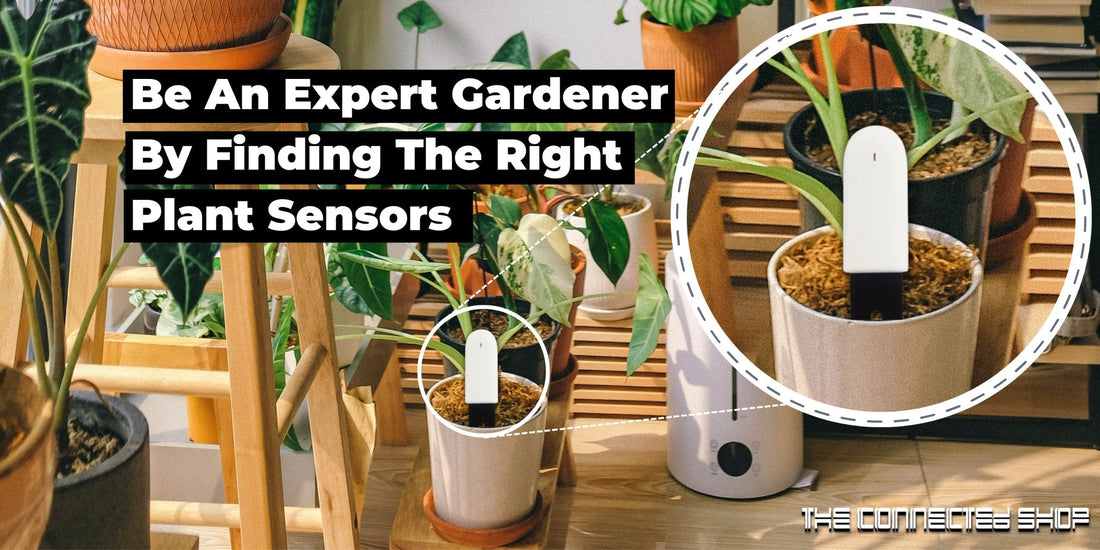Today, the most modern gardening tools are plant sensors, which give the user information on everything from root probes to stem and leaf surfaces and everything else required to feed the plants. It informs us of the nutrients that plant requires and when it needs the most attention.
A plant sensor, roughly speaking, is a tool or device that monitors changes in its surroundings and transmits the data to other devices for further analysis to initiate counter-reactions to the changes.
Moreover, a plant sensor is simple to use. All you have to do is bury it in the ground next to the potted plant. Then, it automatically keeps track of other factors necessary to maintain good plant health, like moisture content, temperature, light levels, and others.
Fueled by the most advanced technology, smart plant sensors can inform you via mobile phones, allowing you to monitor your plants remotely. There are many possibilities for plant sensors due to the rising demand for technologically advanced gardening equipment. While there are tons of plant sensors available in the market, you have to find the right one. Here are some tips to get you guided.
Plant Sensors For Plant Care
Even for those who have a green thumb, determining the condition of a plant can be difficult when it comes to caring for them. Plants don't make noise or exhibit immediate indicators of discomfort, in contrast to mammals that show obvious behavioral changes. It can frequently be too late to take action when problems in their appearance (such wilting or browning) start to manifest, especially if the problem is brought on by a disease.
When there is a water shortage in the soil, it isn't often obvious until it is already late. Simply adding more water to the soil in which the plant is potted can harm the plant by robbing it of nutrients and killing the root system.
How To Find A Genuine Smart Plant Sensor
There are tons of smart plant sensors you can find in the market. They are made of different qualities that will surely help and monitor the overall health of your flowers or plants. You can find a genuine smart plan sensor if you can find the following features:
Soil Moisture Meter
Do my flowers or plants have adequate water? What time should I water them? Do they seem overly dry? Am I watering them too much?
These are legitimate questions. They can have a significant detrimental effect on your flowers or plants if they go unattended. For farmers, horticulturists, landscapers, hobby gardeners, and owners of indoor plants, soil moisture meters are the ideal instruments. By ensuring that valuable water is delivered as needed, the proper use of moisture meters will assist you in maximizing the health of your plants.
Healthy plant growth and development depend heavily on the moisture content of the soil. The soil may become waterlogged if plants are overwatered and it gets too damp. Because they cannot take in enough oxygen, waterlogged roots will eventually die, or they may even get root rot. If your soil is overwatered, your plants will begin to wilt, grow slowly, and eventually perish.
Smart Plant Sensor Mobile App Monitoring
As technology becomes more and more advanced, smart plant sensors take advantage in using this for overall functionality purposes. Here’s how a smart plant sensor mobile app monitoring happens.
A WIFI sensor keeps the promise of making your plants alive especially if you are busy as a bee. It alerts you when is the best time to water the plants, take on and off from light, or when to add food and fertilizers.
Aside from that, The sensor collects information from the plants, including soil moisture, temperature, and light intensity. Then, a web-based or mobile app is used to analyze the data and send you comprehensive care advice.
Waterproof Plant Sensor
Smart plant sensors are commonly used outside. In that case, it should be resistant to any kind of weather and at the same time, waterproof. When finding a smart plant sensor, you must find something that has improved corrosion resistance, longer plates, better circuit performance, and enhanced waterproof performance.
Not only that, you should find a smart plant sensor that addresses the issue of corrosion easily and may be placed in the soil for a prolonged period of time without being damaged. Lastly, it should have a longer length, allowing a more precise measurement of the soil moisture data. The sensor must have an improved waterproof performance and can continue to function normally after being submerged in water.
Light And Temperature Level Sensor
You can gauge the crop's surface temperature using a temperature sensor. Due to circumstances including high light irradiation, chilly outside air, and heat radiation from greenhouse tubes, this temperature can differ from the air temperature. However, it can also happen in situations when there is humidity or a lot of sunlight.
Actual data from any plant, fruit, or leaf is recorded using the plant temperature sensor. This enables you to compare the temperatures of several greenhouses. Additionally, you will be informed when the temperature changes outside the predetermined range. To ascertain precise dew points of certain plants, use this sensor along with a humidity and temperature sensor.
Real Time Overall Plant Health Monitoring
When finding a smart plan sensor to incorporate in your garden, look for a device that has a real time overall plant health monitoring. This allows you to check the two most important factors affecting the growth of your plants, which are the water potential and plant stress.
Studies have demonstrated that the volume of water in plants corresponds with plant development, garden output, quality, and susceptibility to illnesses. Water is an essential component of plant physiology. Despite the strong motivation to evaluate the water content in leaves, few tools are currently accessible like the smart plant sensors.
Final Thoughts
Plant care has a vital role to play. An effective method to increase gardening output is to use plant sensors to morphologically profile and classify plants as well as to track plant health. It is important that when you invest in installing smart plant sensors whether for your backyard or huge landscape, you must find the right one.
Thus, when finding the right smart plant sensor tools, the tips outlined above can surely help you. With the use of these plant sensors, we move ahead towards smart gardening to increase your plants production's affordability, security, and sustainability.






